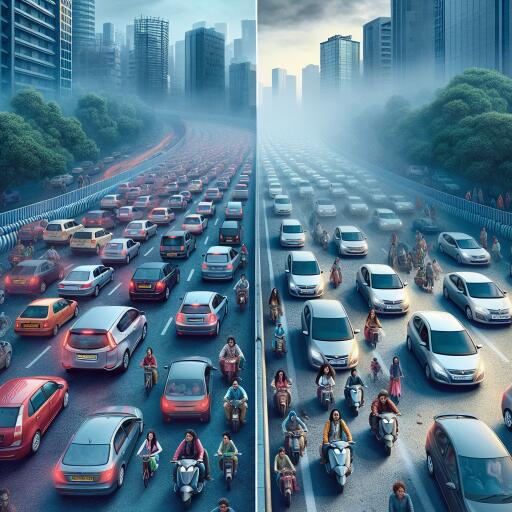The Green Gear Shift: Carpooling as India’s Breather
Ride-sharing isn’t just a way to save on travel expenses; it’s emerging as a vital solution to mitigate pollution and ease traffic jams in India’s crowded cities. Delving into the potential of carpooling, let’s explore its environmental benefits, its synergy with electric vehicles (EVs), and its adaptability to modern work habits, all while spotlighting Togopool’s journey towards promoting sustainable urban mobility.
Clearing the Air on Pollution
In bustling metropolises, especially where the air quality index often breaches the alarming 300 mark, carpooling shines as a beacon of hope. By simply sharing rides, the density of cars on roads can be significantly reduced. This leads to a notable decrease in fuel consumption and, consequently, the emissions of nitrogen oxides and particulate matter, the notorious pollutants. Studies indicate that if embraced widely, carpooling could reduce vehicle emissions in urban centers by 20-30%, making it a formidable ally against pollution.
Electric Vehicles and Carpooling: A Match Made in Eco-Heaven
With the electric vehicle revolution picking up speed, carpooling services are uniquely positioned to further boost EV adoption. By offering incentives for choosing electric, like discounts or access to fast-charging hubs at strategic carpool locations, platforms can significantly enhance the appeal of electric carpooling. Such initiatives could dovetail nicely with governmental support, like tax incentives or rebates for shared EV rides, propelling a sustainable shift in urban mobility.
Easing the Grip of Traffic Congestion
In cities overwhelmed by traffic, like Mumbai, carpooling offers a glimmer of hope. If more people share rides instead of driving alone, the reduction in the number of cars can lead to smoother traffic flow and quicker travel times. Carpooling can also complement public transport by providing crucial last-mile connectivity, further easing congestion. By utilizing advanced technology for route optimization, carpooling can make urban commutes not just bearable but enjoyable.
Making Carpooling a Mainstream Choice
To widen carpooling’s appeal, ensuring safety and building trust are imperative, especially for women and those who rely heavily on two-wheelers. Rigorous vetting processes, real-time tracking, and dedicated lanes for carpooled vehicles are just a few ways to enhance safety and efficiency. Adding to this, promotional campaigns and incentives could encourage more riders to make the switch, appreciating both the cost savings and environmental benefits of sharing their journeys.
Carpooling in the Remote Work Era
The rise of remote work challenges the traditional commuting model, but carpooling can adapt with flexible, on-demand options. By offering dynamic scheduling and corporate carpooling packages for business trips, platforms like Togopool can cater to the evolving needs of the workforce. Utilizing AI for predictive scheduling and blockchain for secured transactions could further streamline the carpooling experience for the occasional office goer.
Togopool: Steering Towards a Sustainable Future
As Togopool sets its sights on becoming a leader in India’s sustainable urban mobility landscape, expanding the network and incorporating cutting-edge technologies form the core of its strategy. By fostering collaborations with governments and businesses and prioritizing user feedback, Togopool aims to make carpooling a reliable, eco-friendly choice for urban commuters. Embracing electric vehicles and integrating smart technologies like AI and IoT will further enhance the efficacy and appeal of Togopool’s services, making it a cornerstone of sustainable urban travel in India.









